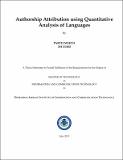Please use this identifier to cite or link to this item:
http://drsr.daiict.ac.in//handle/123456789/418Full metadata record
| DC Field | Value | Language |
|---|---|---|
| dc.contributor.advisor | Majumder, Prasenjit | |
| dc.contributor.author | Mehta, Parth | |
| dc.date.accessioned | 2017-06-10T14:40:17Z | |
| dc.date.available | 2017-06-10T14:40:17Z | |
| dc.date.issued | 2013 | |
| dc.identifier.citation | Mehta, Parth (2013). Authorship attribution using quantitative analysis of languages.. Dhirubhai Ambani Institute of Information and Communication Technology, xiii, 40 p. (Acc.No: T00381) | |
| dc.identifier.uri | http://drsr.daiict.ac.in/handle/123456789/418 | |
| dc.description.abstract | In this work we propose a Kullback Liebler Divergence based method for authorship attribution. We examine several quantitative techniques of authorship attribution that have gained importance over the time including the current state of the art Z-score based technique. First we examine in detail the drawbacks of the existing techniques and the scenario in which these techniques would not be much useful. Then we show how the K.L.D. based method with proper feature selection and normalization can achieve results comparable to the existing Z-score based technique, if not better. In this work we try to find the optimum values for number of terms, smoothing parameter value and the minimum number of texts required for creating an author profile so as to maximise the accuracy of the authorship attribution system. We evaluate the existing and proposed technique on a collection of 5039 articles from weekly supplements of Gujarat Samachar, a popular Gujarati newspaper, written by 40 distinct authors. Our experiments demonstrate that the proposed method performs equally well as the current state of the art method and performs much better than other existing techniques like Delta method or Chi-square based method. We also show that under retrains, like constraint on size of training set and distinguishing between two articles written by same author but under separate columns in the newspaper, our method performs much better even as compared to the state-of-art method. | |
| dc.publisher | Dhirubhai Ambani Institute of Information and Communication Technology | |
| dc.subject | Authorship | |
| dc.subject | Style | |
| dc.subject | Literary | |
| dc.subject | Language | |
| dc.subject | Authorship attribution System | |
| dc.classification.ddc | 070.5072 MEH | |
| dc.title | Authorship attribution using quantitative analysis of languages. | |
| dc.type | Dissertation | |
| dc.degree | M. Tech | |
| dc.student.id | 201111002 | |
| dc.accession.number | T00381 | |
| Appears in Collections: | M Tech Dissertations | |
Files in This Item:
| File | Description | Size | Format | |
|---|---|---|---|---|
| 201111002.pdf Restricted Access | 399.41 kB | Adobe PDF |  View/Open Request a copy |
Items in DSpace are protected by copyright, with all rights reserved, unless otherwise indicated.
